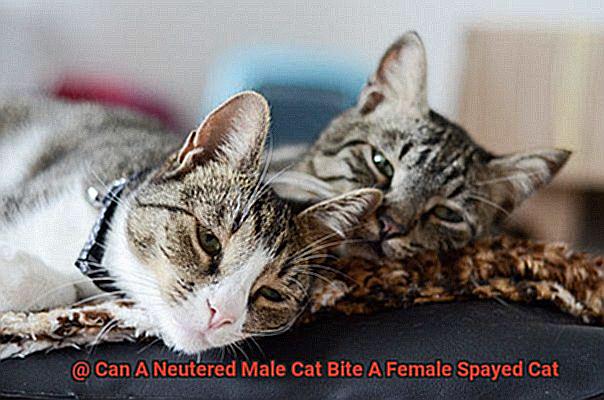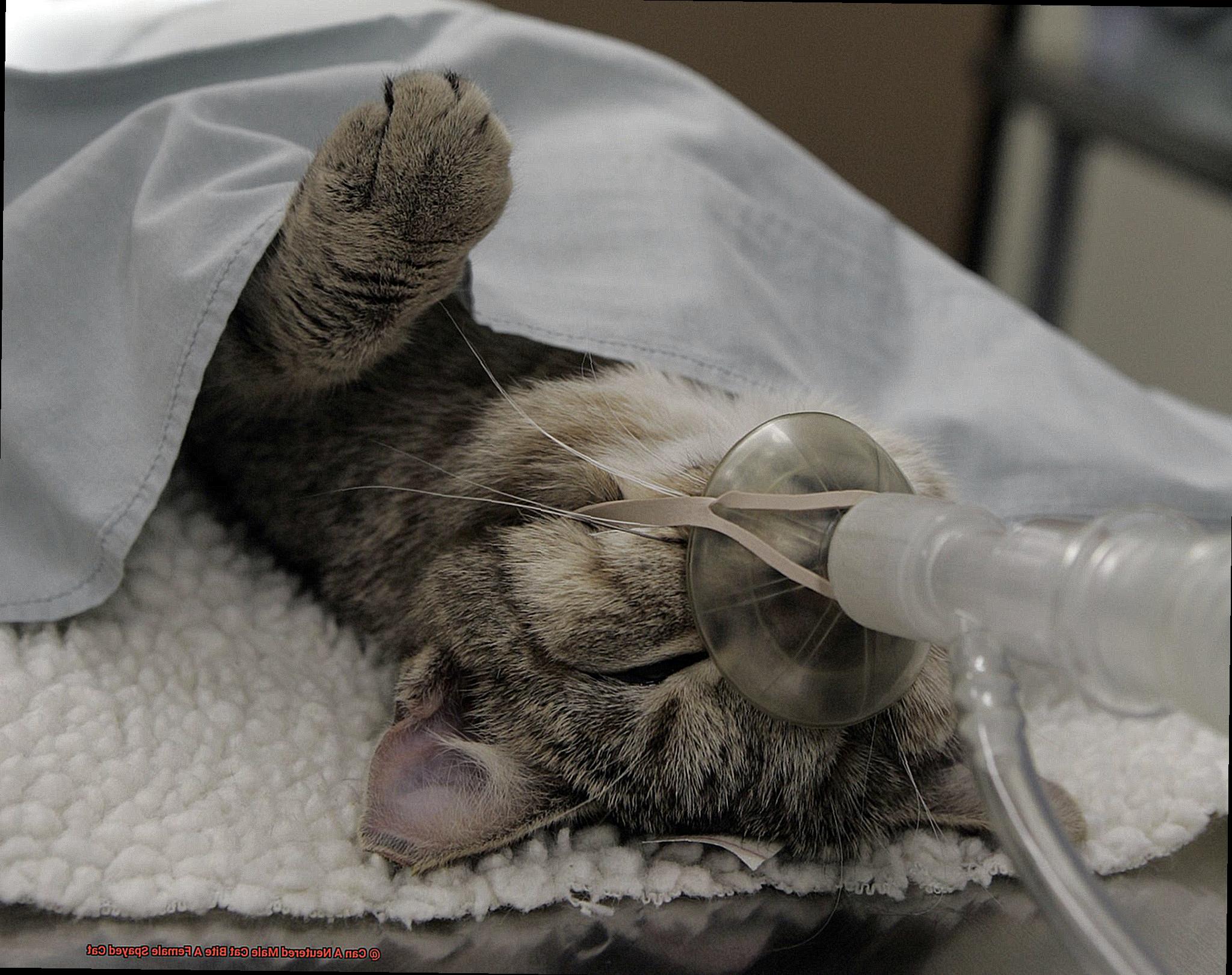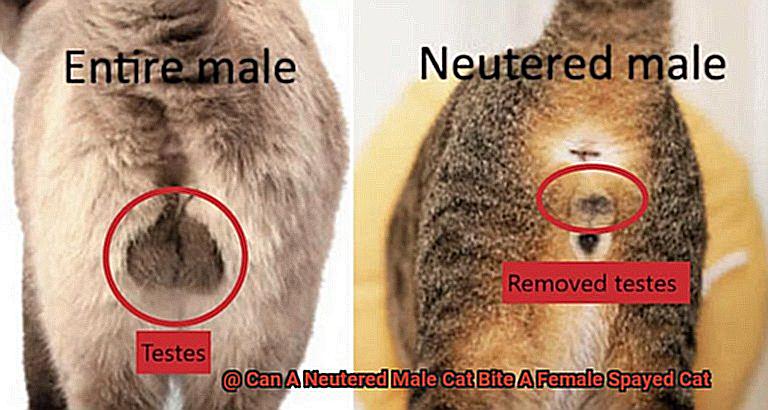Do neutered male cats bite female spayed cats? It’s a valid question, especially if you have both cats in your home. After all, any kind of bite can be dangerous and nobody wants their pet to get hurt.
The answer isn’t straightforward. Neutering a male cat often reduces the likelihood of violence or biting, but there are situations where it can still occur. To keep your cats safe and healthy, it’s important to understand why these behaviours happen.
In this blog post, we’ll explore the various causes that could lead to a neutered male cat biting a female spayed cat, as well as how to prevent such incidents from happening again. We’ll also look at some warning signs that indicate aggressive behaviour so you can take steps to solve it quickly and effectively. With the right understanding and precautions, you can create a safe and secure environment for everyone – including your beloved pets.
How Does Neutering Affect Male Cat Behavior?
Neutering is a popular procedure among pet owners who want to reduce the risk of unwanted litters and make their cat less aggressive. But how does neutering affect male cat behavior?
The answer is complex. Neutering removes the testicles of a male cat, which stops them from producing testosterone – the hormone responsible for driving sexual behavior and aggression in cats. As a result, neutered cats tend to be more relaxed and less aggressive, as well as more affectionate and in need of more attention from their owners.
However, it’s important to note that neutering does not change all aspects of male cat behavior. Some neutered cats may still display mounting and biting habits, especially during playtime – which is usually driven by dominance or play rather than sexual desire.
What Could Cause a Neutered Male Cat to Bite a Female Spayed Cat?
Neutered male cats may seem docile, but they can still bite female spayed cats. What could cause this behavior?
Although neutering does reduce sexual and aggressive conduct, some male cats may still display biting behaviors due to insecurity or a desire to assert dominance.
Additionally, stress or anxiety can also lead to biting in cats. If the two felines have a tense relationship or if there have been any changes in their home environment, such as the introduction of a new pet or a move to a new home, it could cause stress and result in biting behavior.

It is important for cat owners to monitor their cats’ behavior and intervene if necessary to prevent any aggressive behaviors from occurring. Providing plenty of playtime, environmental stimulation, and healthy outlets for energy can help reduce stress and keep cats from becoming overly aggressive.
Sexual Frustration in Neutered Male Cats

Neutering is an effective way to prevent unwanted litters of kittens, but it does not always eliminate mating behaviours in male cats. Neutered male cats may still experience sexual frustration, which can lead to aggressive behaviour such as biting or humping other cats. Pet owners often worry that their neutered cat may attempt to mate with a spayed female, but this behaviour is rare.
It is important for pet owners to understand that such behaviour is usually a sign of distress in their neutered male cats and should not be punished.
Providing enough stimulation, including interactive toys and playtime, can help reduce frustration in neutered male cats. Additionally, it is essential to monitor their behaviour closely and consult a veterinarian if the issue persists.
Neutering reduces testosterone levels in male cats, but it does not eliminate the hormone completely. As such, some neutered male cats may still retain some mating behaviours such as mounting or biting during sexual encounters.
However, this behaviour is usually more of a display of dominance rather than an actual attempt to mate.
Asserting Dominance Through Biting
Biting is a common way for cats to assert their dominance. Even neutered male cats may use biting as a way to establish their place in the hierarchy or demonstrate their superiority.
This behavior is often seen during mating season, where male cats become more aggressive towards female counterparts, biting their necks and backs in an attempt to control and facilitate mating.
However, neutering a cat does not always eliminate its urge to mate entirely. While neutered cats are less likely to display procreating behavior, some may still attempt to mount and hump female cats due to hormonal urges or simply out of habit. If the female cat does not welcome these advances, it can result in biting.

In the case of a neutered male cat biting a female spayed cat, owners should observe their cats’ body language closely and take appropriate measures if they suspect any signs of aggression or anxiety.
It could be due to lack of socialization or improper training, so providing enough stimulation and proper training will help reduce anxiety and aggression in cats. Consulting with a veterinarian can provide more information on how best to handle your pet’s behavior.
Potential Dangers of Biting for Female Spayed Cats
Mating season can be a dangerous time for female spayed cats, as they are at risk of being bitten by male cats. This biting can cause severe injuries, infections, and even the transmission of deadly diseases.
When male cats bite female spayed cats during mating, it can lead to open wounds that are vulnerable to bacterial infections. These bites can cause pain and discomfort for the female cat, as well as abscesses and other health complications. Furthermore, female cats may become aggressive during mating and engage in fights with male cats.
Moreover, biting can also result in the spread of diseases such as FIV, FeLV, or even rabies – all of which can be fatal for cats. It is essential to monitor your cat’s behavior during mating season and take necessary precautions to prevent injuries and disease transmission.
In conclusion, if you have a spayed female cat it is important to be aware of the potential dangers of biting during mating season. Consulting your veterinarian can help you protect your pet’s health during this time and avoid any potential risks.
Signs That a Male Cat is Becoming Aggressive or Trying to Mate
Male cats can be unpredictable, so it’s important to recognize the signs of aggression or mating behavior in your feline friend. Even if a male cat has been neutered, they may still attempt to mate with a spayed female cat. To ensure your pet’s safety and wellbeing, it’s crucial to stay informed and aware of their behavior.
Vocalization is one of the most common signs of a male cat becoming aggressive or trying to mate. If your cat is yowling or meowing more than usual, this could be a sign of their sexual frustration or dominance over other cats. Territorial activity is another warning sign to watch out for – if your cat starts marking their territory more frequently or becomes agitated when other cats come into their space, they may be competing for mating opportunities.
Biting the necks of female cats during mating attempts is another surprising behavior that male cats may exhibit. This not only asserts dominance over the female but helps them remain stable during the act of mating.
While neutered male cats may not be able to penetrate a female cat, they can still become aggressive and even injure the female during mating attempts.
How Can Owners Prevent Their Neutered Male Cat from Biting a Female Spayed Cat?
For pet parents of a neutered male cat and a female spayed cat, the fear of their cats getting into combat is understandable. Although neutering reduces sexual and aggressive behaviour in male cats, it does not mean that they will never exhibit biting behaviour towards female spayed cats.
Fortunately, there are steps you can take to ensure peaceful coexistence between your cats.

First and foremost, make sure each cat has their own space within the home, including separate beds and litter boxes. This will help minimize any competition or tension between them. Also, be sure to supervise interactions between your cats and intervene if any aggressive conduct occurs.
Play therapy is also a great way to avoid fighting between your cats. Redirect their sexual energy away from traditional avenues by providing them with toys and interactive playtime; this decreases their desire to mate with the female cat and ultimately prevents biting. Pheromone diffusers or sprays may also be used to soothe anxious cats and reduce tension between them.
At the end of the day, understanding and patience are key in preventing your neutered male cat from biting a female spayed cat.
EDcP1ChNjRQ” >
When Should Owners Seek Professional Help?
If so, professional help may be the answer. Seeking out expert advice can help owners identify and address underlying medical or behavioral issues, as well as reducing the risk of physical altercations and injuries.
When it comes to interactions between neutered male cats and spayed female cats, there are several behaviors that may cause owners concern.
If your neutered male cat is displaying persistent and aggressive mating behavior towards your spayed female cat, professional assistance should be sought.
A qualified animal behaviorist or veterinarian can offer solutions to modify the aggressive behavior and reduce the likelihood of injury.
On the other hand, if your spayed female cat is exhibiting unusual aggression towards your neutered male cat, it’s best to seek professional help right away. Excessive aggression could be a sign of an underlying medical problem or behavioral disorder that needs to be addressed by a medical professional.
Finally, if your neutered male cat is engaging in aggressive behavior towards other male cats, even those that have been neutered, it’s time to call on an expert. This could be a sign of territorial aggression or social anxiety that requires specialist attention.
Don’t let your cats’ aggressive behavior get out of hand – seek professional help as soon as possible.
Also Read: Why Is Male Cat Attacking Pregnant Female? – 21Cats.org
Conclusion
In conclusion, neutering a male cat can help reduce aggression and the desire to mate. However, it does not eliminate all mating behaviors in male cats, so owners should remain vigilant. To prevent incidents of a neutered male cat biting a female spayed cat, it’s important to understand the various causes that may lead to such behavior.
Keep an eye out for signs of aggression or mating behaviour and take appropriate steps if necessary. Additionally, providing plenty of playtime and environmental stimulation can help reduce anxiety and prevent violent behavior from occurring.
If the issue persists or if there are underlying medical or behavioral problems that need to be addressed, professional assistance may be required.







